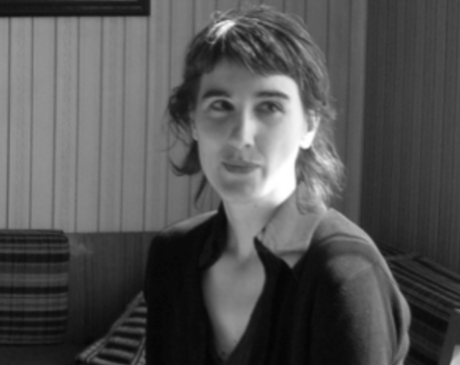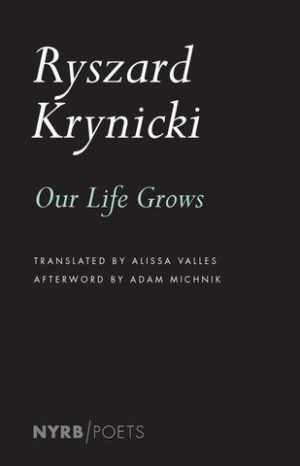In Their Own Words
Alissa Valles on Ryszard Krynicki's “What Luck”

What luck
What luck: two survivors from Nineveh,
Pompeii, from the ghetto of Drohobycz,
we meet at the Central Station
erected on the ash, breath and dust of the dead,
the murdered, the nameless, who perished without a trace,
and we remember our dead,
murdered, nameless affairs, perished without a trace,
the immortal sky and dead landscapes,
liberty, equality, fraternity, compassion, altruism, understanding,
alpha and omega of smoke shallowly buried in the displaced air,
shreds of burnt paper, ghosts of letters and books,
carried further and further, higher and higher on streams of air,
crossing all inhuman, moveable and death-carrying borders,
specters of burnt books, disintegrating at a touch,
specters of our old and new, dead and living persecutors,
and we remember our old teachers
and girls now living only in our hearts
and the unceasing clicking of their shoes
behind ghostly windows.
—Translated by Alissa Valles
From Our Life Grows (NYRB, 2017). All rights reserved. Reprinted with the permission of the author.
On "What Luck"
Like many of Ryszard Krynicki's poems, "What Luck" exists in several versions, and before I came to translate this one, I read the later version in which Nineveh and Pompeii are replaced with 'Warsaw' and 'the Betar movement', bringing the poem unambiguously into 20th century Poland. Discovering the original version in Krynicki's 1978 collection, Our Life Grows, I was struck by the rich meaning added by the layering of time and the expansion of the poem to ancient Mesopotamia and Rome. In Poland, a country that experienced a storm of destruction during World War II, it is difficult to achieve any clarity in one's view of the European past to which Polish culture undoubtedly belongs: the Holocaust and the ravages of two occupations and forty years of repression seem to suck all the oxygen out of the landscape.
The invocation of Nineveh creates a vista in which the leveling of Warsaw in 1944 can resonate with older losses—to the absolute pitch of grief it adds the vast range of human history. This in turn frees a reader to consider the ambiguities implicit in the story of any sacked city: for example, the Nineveh of the Book of Jonah, where the citizens repent and are saved from annihilation, has a story very different from that of the historical city, which was unequivocally destroyed by a combination of attackers in 612 BC. Pompeii, buried under lava, in turn adds the dimension of natural, not man-made disaster, and the cruel arbitrariness of who survives (and the fact that the dead, caught forever in their last gestures, can seem to us now more real than those who escaped). Above all, the shift from ancient to modern history opens a door to the memory of more recent disasters, and the 'dead landscapes' we are forever building over in our thirst for the future.
At the same time, this poem, steered by the complex movements of grief and the counterpoint of reason, manages to do something only the great elegies do: it simultaneously mourns and judges; it is both a cry and an argument. It calls its affairs 'murdered, nameless', and then proceeds defiantly to name some of them, and even to raise their ghosts for a moment. It is characteristic of Krynicki to describe books as living beings possessed of souls that, torn from their objects, are free to cross the borders he designates with the Celanian adjective 'death-carrying'. One of the 'moveable borders' the poem invokes is that between the Soviet Ukraine and Poland. Dohobycz—the native town of the great Polish-Jewish writer Bruno Szulc, whose work was very important to Krynicki from early on—is one of the many towns that were part of Poland before the war but were annexed by the Soviet Union. Kozova, the town from where Ryszard Krynicki's parents came, is only a moderate distance from Drohobycz, as is Czernowitz (or Chernivtsy), Celan's home town.
The conference at Yalta (also Ukrainian, until Putin annexed the Crimea is 2014) at which these territorial settlements were made, turned out to be the burial ground of political ideals like 'liberty, equality, fraternity' and the birthplace of new persecutions and book-burnings. It is this continuity that gives the poem's title its full irony. How lucky is it to survive one annihilation only to have to face the depradations of new, 'improved' annihilators? Citizens of the ruins of Mosul, of which ancient Nineveh is now an outlying part, newly liberated from the ferocious occupation of so-called Islamic State, may well ask themselves now what is to come and remember their own ghostly teachers and 'girls now living only in our hearts'. Faithful to the practice of destroying all pre-Islamic traces, the fled persecutors did their honest best to wipe out the remnants of Nineveh. Krynicki's poem, with its extraordinary generosity of grief, enfolds within its bitter litany the stubborn remembrance of every fallen city, present, past and to come.



